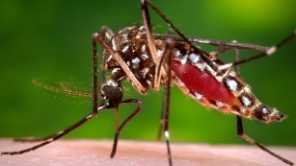Zika virus may pass through sex besides mosquitos, CDC issues new safe-sex guidelines
The Zika virus is now known to not only be transmitted via mosquito bites, but also via sperm. The CDC has confirmed Zika has been sexually transmitted in Texas on Wednesday. The virus has spread to at least 29 countries. Friday the CDC has issued new safe-sex guidelines especially for pregnant women:
"Men who live in or travel to areas of active Zika infections and who have a pregnant sexual partner should use latex condoms correctly, or refrain from sex until the pregnancy has come to term," [CDC Director Dr. Tom Frieden] told CNN's Gupta, "or until a test is available to see if he could possibly infect her."
While a study that showed Zika only stayed viable in blood and saliva for a week, "We don't know how long Zika can persist in semen," Frieden said. "We're doing those tests now, but it could be weeks to months before we have an answer.
Frieden also said that 4 out of 5 people with Zika show no symptoms (which can be mild and include fever, rash, headache, red eye). The reason for the caution especially for pregnant women is to protect the unborn babies from developing a neurological disorder:
"Each passing day, the linkage between Zika and microcephaly becomes stronger," Frieden said. Microcephaly results in babies being born with abnormally small heads that can lead to severe development delays and even death.
Since November, Brazil has seen 404 confirmed cases of microcephaly in newborns. Seventeen of those cases have a confirmed link to the Zika virus. Fifteen babies have died from the condition, with five linked to Zika. An additional 56 deaths are under investigation, and authorities are investigating 3,670 suspected cases.
The CDC has not made any advices regarding kissing, though the Zika virus has been found to be active in saliva, besides urine.
"People have already shown that it can spread to bodily fluids other than blood, so this isn't entirely surprising," [CNN's Dr. Sanjay Gupta] said. "Presence of virus in saliva doesn't mean that it's necessarily transmissible that way."
Other labs, including the CDC, must now confirm the Fiocruz finding, Gupta said.
"We are not issuing guidance on kissing," Frieden said in the news briefing. "We take all reports seriously, but we need more information including the methodology of the study. The bottom line is Zika is primarily a mosquito-borne disease."
Read more on CNN "CDC issues new safe-sex guidelines around Zika virus"



 Report a concern
Report a concern

 Add Comment
Add Comment



